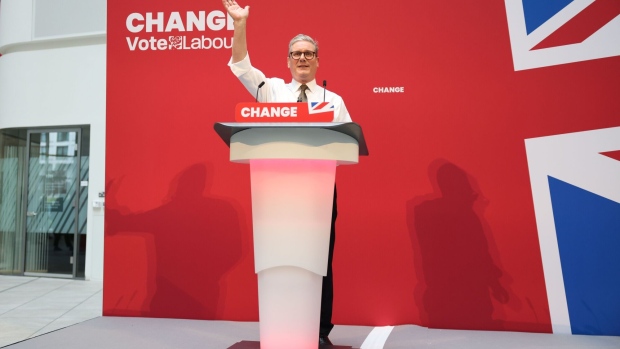Jun 25, 2024
UK Labour to Seek Economic Growth of at Least 2.5%, Starmer Says
, Bloomberg News

(Bloomberg) -- Keir Starmer, who polls show is on course to be Britain’s next prime minister, said his Labour Party would seek annual growth of at least 2.5% if it won power — a rate that economists argue is unrealistic.
“Under the last Labour government, we grew by about 2.5%,” Starmer said in an interview with ITV which was recorded on June 21 and due to air on Thursday. Asked if he was looking to achieve the same, he replied: “Certainly, yes.”
While Starmer has put economic growth at the heart of his pitch ahead of the July 4 election, he hasn’t specified a figure. He’s trying to to position Labour as the “party of wealth creation” after stagnation under Rishi Sunak’s Conservative Party. The UK has struggled for momentum as the highest interest rates in 16 years continue to weigh on firms and households.
Starmer is banking on a quick return to growth to avoid having to make painful tax and spending choices if his party wins. The Labour leader has said he doesn’t need to spell out how he’d fix Britain’s public finances because economic growth will boost the tax take and plug the gap.
Bloomberg Economics predicts the next administration would need to find £20 billion ($25.3 billion) of revenue-raisers to deliver current spending plans. Bloomberg UK economists Dan Hanson and Ana Andrade expressed skepticism about Starmer’s hopes for a “growth miracle” in a note on Wednesday.
“A laudable goal? Absolutely. Realistic? Unfortunately not,” Hanson and Andrade said of the 2.5% target, noting that a similar goal had motivated former premier Liz Truss market-roiling budget plans in 2022. The best sustainable growth rate that could be hoped for is around 2%, they said, with average growth of 1.2% projected over the next two decades.
“The next administration needs to be prepared for a situation where the economy continues to muddle along,” Hanson and Andrade said.
The Institute for Fiscal Studies think tank and other economists have also said it isn’t credible to believe growth will come to the rescue so quickly. Starmer has hit back at this critique, saying he doesn’t accept such “defeatism” on the economy.
Starmer is planning a blitz of planning reforms to boost house-building and expand infrastructure, while also creating a state-run clean energy company, GB Energy, to spur the net-zero transition. Other plans include reforming workers’ rights, creating a new industrial strategy and setting up a national wealth fund.
--With assistance from Alex Wickham and Andrew Atkinson.
©2024 Bloomberg L.P.







